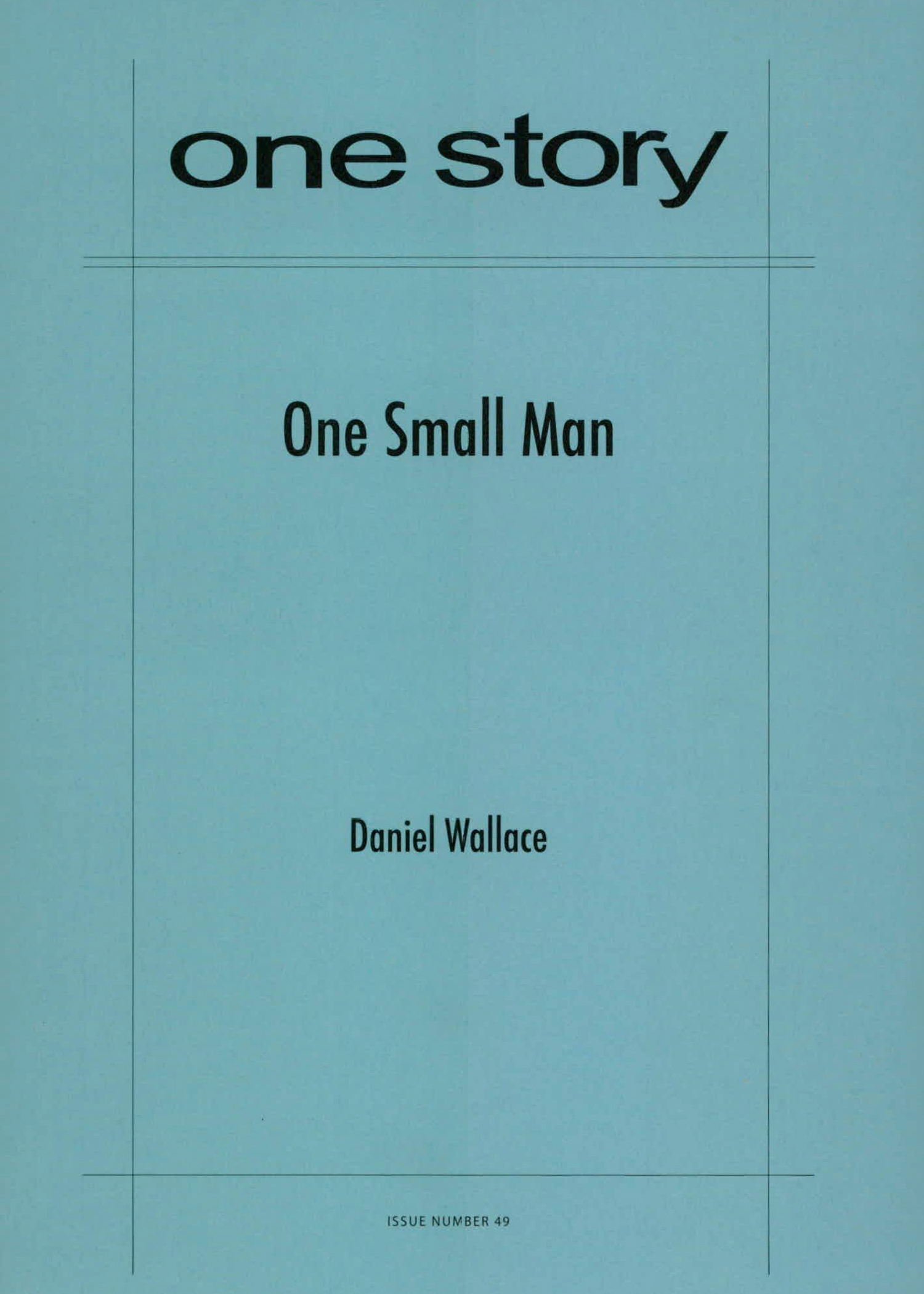
One Small Man
$2.50
Sold out
Excerpt
He came on a dark night. No moon that I remember and the stars had all gone dim. But no clouds either, really, just that plain dark empty space, and the lights of the cab breaking through it all like long thick streams of butter, cutting into the black and settling finally on the Peach Blossom, our hotel, as though somehow it had been chosen, designated, the place at which this light would come to rest. I watched it all from the windows of the diner, half a block away.
What is fate? Something like something having to happen this way and no other way no matter what. That’s what it was like I guess. If this were a movie, there’d have been music. I’d have been sponging down the counter like I was and I’d have seen those lights and looked over at Roger, who was scribbling something on a napkin, and he would have glanced up at me and said, “What, Carla?” the way he actually did say it, and I would have looked back at the lights like I hadn’t heard him, and the music would kind of swell so you knew something about this was big, really big, the way I knew it was then, in real life, without the music or anything. I just knew.
Daniel Wallace
Daniel Wallace is the author of Big Fish (1998), Ray in Reverse (2000) and The Watermelon King (2003), as well as many stories. His essays and drawings have appeared in the L.A. Times and Italian Vanity Fair. Born and raised in Alabama, he now lives in Chapel Hill, North Carolina with his lovely wife Laura and his amazing son Henry, who is almost 12. To see more of Daniel’s illustrations, please visit www.danielwallace.org and www.ogreatrosenfeld.com.
Q&A by Hannah Tinti
- HT: Where did the idea for this story come from?
- DW: For a long time I only had the first sentence, He came on a dark night. I looked at that sentence for a long time and didn’t have a clue. Then I wrote the rest of the first paragraph in a leap of faith that if I did, another paragraph would come after it. I still didn’t know who he was, though, this guy who comes on the dark night, or who the she was narrating the story. After I figured out who they were, one thing led to another. Sometimes it feels like ideas don’t come from anywhere though; sometimes it feels like you have to hunt the wild things down, capture them, and bring them back to civilization.
- HT: What was the most challenging aspect of writing this story?
- DW: That would be trying to understand what everything had to do with everything else: what Mr. Hoshigawa, the Indian mounds and Carla all had in common. I think—I hope—I figured it out.
- HT: Do the Chatuguain Indian mounds really exist? If so, what inspired you to write about them, and if not-how did you come up with the idea?
- DW: Not only do the mounds not exist, the Chatuguain Indians don’t either: I made them both up. There were a lot of Indians in Alabama once—Cherokee, Choctaw, Creek etc—and Indian mounds are all over the place, so I imagine it just as easily could have been one of them. But making something up out of thin air is easier and more fun for me than dealing with a real historical moment. Real historical moments demand real research, and I don’t do that well.
- HT: Why did you decide to tell this story from Carla’s point of view?
- DW: I think that happened, again, because of the first sentence I wrote: He came on a dark night. Where there’s a he there’s usually a she in there somewhere. It was Carla.
- HT: In some ways, this is a classic ‘stranger comes to town’ story. Why did you choose Akira Hoshigawa as your stranger? Did you know from the start what his purpose was?
- DW: I modeled him on a guy I used to work for when I lived in Nagoya, Japan, and no, I had no idea why he was there. Not knowing in fact became one of the ideas in the story: no one knows why he’s there. Everybody—like me—just makes stuff up.
- HT: You capture this small town so completely—and many of your books also feature small towns. What is it about the small town community that captures your imagination?
- DW: A small town has it all: history, love, eternal hatreds. And it’s within a two block area.
- HT: How long did it take you to complete this story?
- DW: A long time. Weeks passed between the first sentence and the rest of the first paragraph. Then I was stuck for a long time and I put it aside to work on other things. A few months later I came back to it and the story sort of opened up in my mind, and after that it spilled out pretty quickly.
- HT: What is the best bit of advice about writing you have ever received?
- DW: The best advice I’ve gotten is not to die. The longer you live the better writer you’ll become, because it takes such a long time to learn.
- HT: What are you working on now?
- DW: I’m busy. I’m writing a novel. I can’t talk about it until I’m through, so I take breaks from it and write short stories, which don’t take as long and I can show to people and prove that I’m actually doing something.